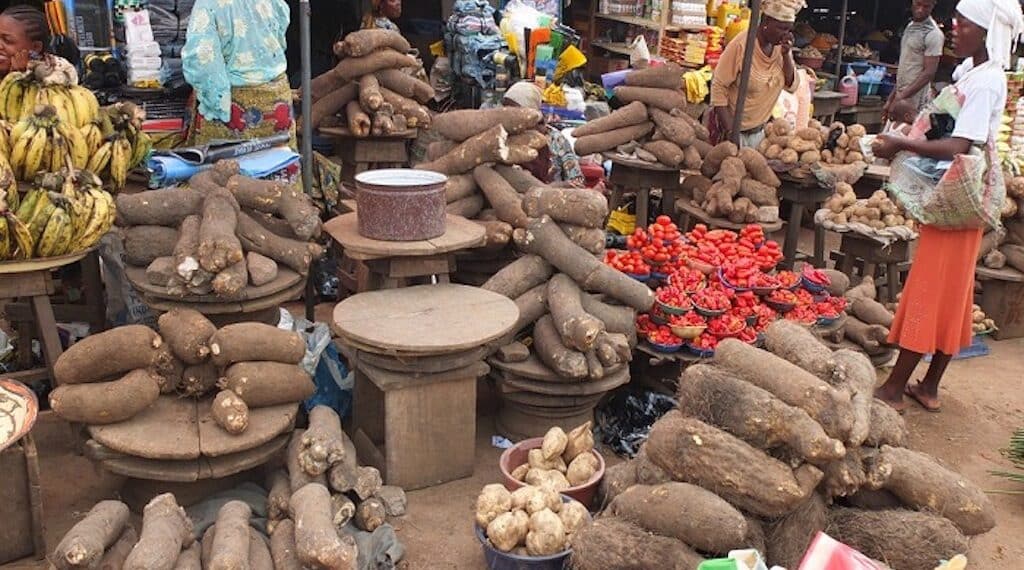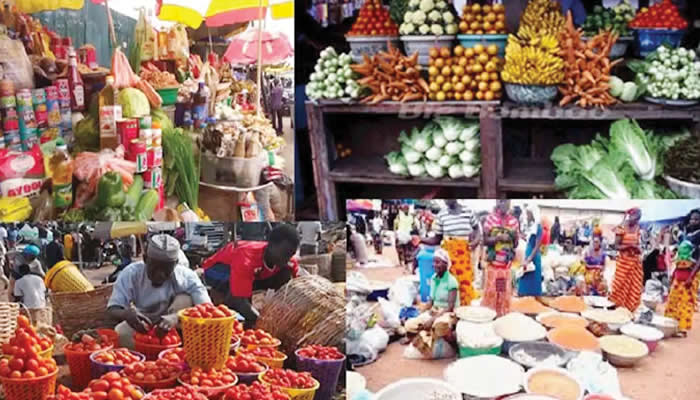The prices of food items in Nigeria’s Northeast region have dropped significantly as farmers bring in large quantities of harvested grains ahead of the Ramadan fast. The decrease in food prices follows a bumper harvest recorded across states like Borno, Adamawa, Taraba, and Yobe.
Farmers Boost Market Supply
Major markets in the region are witnessing a surplus of food items, leading to a decline in prices. Farmers and traders are rushing to sell their produce to prepare for the Ramadan season. Findings reveal that crops such as maize, rice, millet, beans, groundnut, yam, and onions are now available in large quantities.
Join our WhatsApp ChannelA trader in Maiduguri Market, Abubakar Kois, attributed the price reduction to the absence of middlemen. “At the local market, prices of grains like maize and beans are gradually coming down. A bag of beans, which was previously over N80,000, is now around N60,000,” he said.
READ ALSO: Global Food Prices Drop By 2%- Reports
Food Prices See a Sharp Decline
The crash in food prices is evident across various food markets. In Yobe, the price of millet has dropped from N80,000 to N60,000 per bag, while brown beans now sell for N90,000 instead of N120,000. Groundnut prices have seen an even sharper decline, with a bag now going for N130,000 compared to N210,000 last year.

In Damboa town, maize prices fell from N54,000 to N40,000 per 100kg bag, while soybeans are now N32,000, down from N40,000. Sorghum has also dropped from N50,000 to N41,000. Locally processed rice now sells for N1,300 per mudu, down from N3,600.
Impact of Government Support
Government intervention has played a role in increasing food supply. In Borno State, Governor Babagana Zulum provided farmers with free transportation, security through agro-ranger special squads, and farming inputs. Similarly, Governor Mai Mala Buni of Yobe invested in farm inputs and tractors to boost production.
A social analyst, Abdulmumini Gulani, commended the price reduction, saying, “The drop in food prices is a positive development that will ease the burden on citizens. The government’s support for farmers is commendable.”
Fluctuations in Adamawa Markets
While food prices are dropping in most areas, markets in Adamawa are witnessing fluctuations. In Jimeta Market, maize and beans prices have decreased, but other food items remain high. Traders blame the instability on middlemen making bulk purchases.
A trader, known as Yellow, said he bought grains worth N10 million last year but has been unable to sell due to the price drop. “I am waiting for prices to rise before selling to avoid losses,” he said.
Market Trends and Economic Factors
Experts believe the fall in food prices is linked to multiple factors, including the surplus harvest, reduced bulk buying, and the current economic situation, which has led to a lower cash flow in markets. The recent reintroduction of rice imports has also played a role in stabilizing grain prices.
Despite the decline, some traders fear that prices may rise again due to market speculation and external factors such as fuel price fluctuations. As the Ramadan fast approaches, consumers are hopeful that food prices will remain stable, ensuring an affordable season for many households.
Call for Government Action
While the price drop is a relief, farmers and traders are urging the government to address challenges such as high fertilizer costs and limited access to farming inputs. They argue that consistent support for local farmers is necessary to maintain steady food production and market stability.
With markets currently flooded with grains and other food items, Nigerians are taking advantage of the lower prices. However, the long-term stability of food prices will depend on continued government support and favorable economic conditions.
Emmanuel Ochayi is a journalist. He is a graduate of the University of Lagos, School of first choice and the nations pride. Emmanuel is keen on exploring writing angles in different areas, including Business, climate change, politics, Education, and others.


















